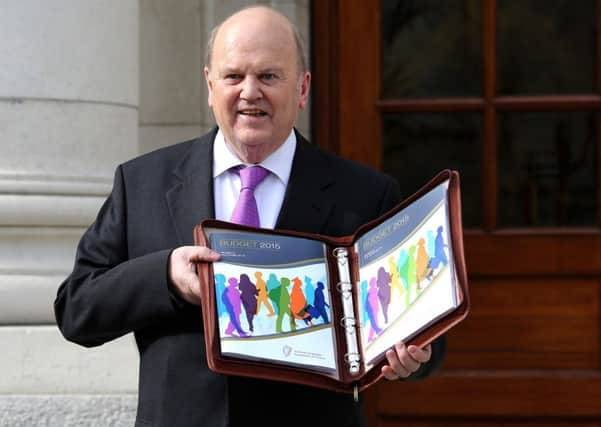Ireland Budget marks recovery with giveaway plans


Less than two years from the next Irish general election, Michael Noonan announced the first welfare increases, income tax reductions and major public recruitment drive since the economy’s spectacular nosedive.
With Ireland now being hailed as one of Europe’s fastest-growing economies, Mr Noonan insisted it would not return to the boom-and-bust model of the past.
Advertisement
Hide AdAdvertisement
Hide Ad“The road we have travelled to get to this point has been very difficult and the Irish people have made major sacrifices, but the policies pursued by this government have worked and the recovery is well under way,” he said.
“The recovery has not spread across the country yet and many families have yet to experience it. The government is fully aware of this fact.”
He said for some the recovery would only come if they get a job, for others when they see more money in their pockets. He added: “For many families, the permanent return of a loved one who has emigrated will mark the end of the crisis.”
Mr Noonan set the scene for the first payback for a country crippled by bank debts.
Outlining economic forecasts, Mr Noonan told the Dail he expects GDP growth of 4.7 per cent this year and 3.6 per cent next year.
Unemployment is predicted to come down to 10 per cent next year.
He also confirmed a phasing out of controversial tax arrangements – known as the “Double Irish” – which allows multinationals to slash their tax bills by locating in Ireland.
“I am abolishing the ability of companies to use the ‘Double Irish’ by changing our residency rules to require all companies registered in Ireland to also be tax-resident,” he said.
Advertisement
Hide AdAdvertisement
Hide AdThe law will kick in on 1 January next year for new companies, but firms already benefiting from the loophole will have until the end of 2020 to comply with the changes.
“This proactive change will not bring an end to international tax planning. That requires co-ordinated action by all countries,” said Mr Noonan.
“By taking action now and making this change as part of a broader reform of our corporate tax system, we are giving certainty to investors about corporate tax in Ireland for the next decade.”
But the finance minister trenchantly defended Ireland’s 12.5 per cent corporation tax, which has attracted criticism from some European leaders.
“The 12.5 per cent tax rate never has been and never will be up for discussion,” he said. “The 12.5 per cent tax rate is settled policy. It will not change.”
Among planned tax rises to pay for spending measures totalling €585 million (£465m), the price of a packet of 20 cigarettes smashed through the €10 (£8) barrier with a 40 cent increase from midnight.
However, taxes were frozen on alcohol, petrol and diesel.
“I am not raising any other taxes because I am able to fund the costs of these reforms and incentives through improved tax revenues arising from economic growth and continued expenditure restraint,” Mr Noonan said.